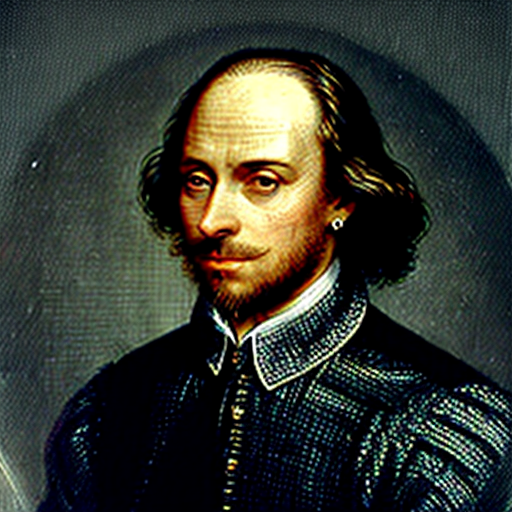The Elizabethan Era: A Cultural Renaissance
The Elizabethan Era, spanning from 1558 to 1603, was a period of cultural renaissance in England that coincided with the lifetime of William Shakespeare. During this time, Queen Elizabeth I ruled the country, and the arts flourished with the construction of iconic theaters like The Globe. Shakespeare himself wrote and produced many of his most famous plays, contributing to the golden age of English literature. Additionally, significant historical events such as the defeat of the Spanish Armada in 1588 and the exploration of the New World by figures like Sir Francis Drake and Sir Walter Raleigh took place, shaping the political and social landscape of the era.
The Reign of Queen Elizabeth I: A Golden Age of England
One interesting fact about historical events that occurred during William Shakespeare's lifetime is that the famous Globe Theatre, where many of his plays were performed, burned down during a performance of his play 'Henry VIII' on June 29, 1613. The fire started when a cannon was fired as part of the play's special effects, igniting the thatched roof. Despite the fire, the Globe Theatre was rebuilt the following year and continued to host Shakespeare's plays until it was closed down in 1642.
The reign of Queen Elizabeth I, from 1558 to 1603, was indeed a golden age for England, coinciding with the lifetime of William Shakespeare. This period saw England emerge as a major world power, with notable achievements in literature, exploration, and the arts. Historical events such as the defeat of the Spanish Armada in 1588, the establishment of the Church of England, and the flourishing of English drama with the works of Shakespeare and his contemporaries marked this era as a time of great cultural and political significance. Queen Elizabeth's leadership and patronage of the arts played a crucial role in shaping the identity of England during this remarkable period.
The Globe Theatre: Shakespeare's Theatrical Legacy

The Globe Theatre stands as a symbol of William Shakespeare's enduring theatrical legacy during the Elizabethan Era. Constructed in 1599, this iconic theater was where many of Shakespeare's plays were first performed, captivating audiences with timeless works such as 'Romeo and Juliet,' 'Hamlet,' and 'Macbeth.' The Globe became a hub of artistic innovation and cultural exchange, attracting diverse crowds from all walks of life. Its open-air design and central location in London's Bankside district made it a popular destination for both the aristocracy and the common people, fostering a sense of community and shared experience through the power of live performance.
The Globe Theatre's establishment also coincided with several significant historical events that shaped the landscape of Shakespeare's lifetime. During this period, England was embroiled in political and religious turmoil, with Queen Elizabeth I navigating the challenges of maintaining stability and asserting English dominance on the world stage. The defeat of the Spanish Armada in 1588 marked a pivotal moment in English history, solidifying England's position as a formidable naval power and bolstering national pride. These events provided a backdrop of intrigue and tension that often found reflection in Shakespeare's plays, which explored themes of power, ambition, and the complexities of human nature.
As the Globe Theatre thrived as a cultural institution, Shakespeare and his contemporaries continued to produce groundbreaking works that resonated with audiences of the time. The vibrant energy of London's theater scene, coupled with the patronage of Queen Elizabeth I and her successor, King James I, fueled a creative renaissance that elevated English drama to new heights. The Globe became a platform for artistic experimentation and collaboration, with actors, playwrights, and audiences coming together to celebrate the power of storytelling and the magic of live performance. Shakespeare's enduring popularity and influence endure to this day, a testament to the enduring legacy of the Globe Theatre and the rich tapestry of historical events that shaped his remarkable career.
In 1613, tragedy struck the Globe Theatre when a fire destroyed the original structure during a performance of Shakespeare's play 'Henry VIII.' Despite this devastating setback, the spirit of the Globe lived on through the resilience of its creators and the enduring legacy of Shakespeare's works. In 1997, a faithful reconstruction of the Globe Theatre was completed near the original site, allowing modern audiences to experience the magic of Shakespearean drama in a setting reminiscent of the Elizabethan era. The Globe continues to serve as a living monument to Shakespeare's theatrical genius and the enduring power of storytelling to transcend time and space, connecting people across generations through the universal language of art and imagination.
Historical Events and Political Turmoil in Shakespeare's Time
A fun fact about historical events that occurred during William Shakespeare's lifetime is that the first recorded performance of a female actor on the English stage took place. In 1660, Margaret Hughes became the first woman to perform in a professional theater production in England, during the reign of King Charles II. This event happened while Shakespeare's plays were still being performed and adds an interesting layer to the theatrical world of his time.
During William Shakespeare's lifetime in the late 16th and early 17th centuries, England was marked by significant historical events and political turmoil that influenced the cultural landscape of the era. The reign of Queen Elizabeth I saw England emerge as a major world power, with notable achievements such as the defeat of the Spanish Armada in 1588 and the exploration of the New World. However, internal strife and religious conflicts also characterized the period, as tensions between Protestants and Catholics simmered beneath the surface. The political intrigue and power struggles of the time found echoes in Shakespeare's plays, which often delved into themes of ambition, betrayal, and the complexities of human nature. These historical events provided a rich backdrop for Shakespeare's works, reflecting the uncertainties and challenges of a society in flux.

